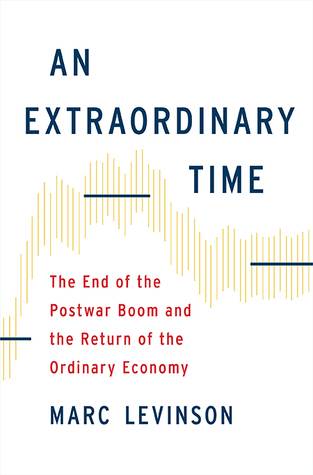
An Extraordinary Time
The End of the Postwar Boom and the Return of the Ordinary Economy
کتاب های مرتبط
- اطلاعات
- نقد و بررسی
- دیدگاه کاربران
نقد و بررسی

Starred review from September 26, 2016
In the 1970s the global economy went to hell and stayed there because of overt shocks and deep transformations, argues former Economist editor Levinson (The Box) in this probing history. He pinpoints 1973 as the turning point when the Arab oil embargo, the collapse of the Bretton Woods exchange-rate mechanism, and stagflation ushered in slow growth, instability, economic insecurity, and debt crises after the strong economic growth and soaring living standards of the preceding post-war years. He tours three decades of responses to the permanent slump, including Keynesian stimulus and price controls on the liberal side as well as the conservative agenda of free markets, deregulation, privatization, and government austerity. He argues that neither program succeeded because of a permanent and intractable slowing of productivity growth, grimly concluding that economic torpor is the new normal and that the dynamic post-war prosperity will never return. Levinson’s account of this vexed era is lucid, well-paced, and entwined with vivid sketches of economists, central bankers, and politicians who failed to restore the pre-1973 good times. He also succeeds at translating complex economic issues into understandable terms for lay readers. Levinson’s admirably evenhanded treatment of recent economic history steers clear of dogmas on both left and right to explore knottier truths. Agent: Ted Weinstein, Ted Weinstein Literary.

September 15, 2016
An economic historian challenges both politicians and economists in this account of why the post-World War II economic boom came to an end and what followed.Former Economist finance and economics editor Levinson (The Great A&P and the Struggle for Small Business in America, 2011, etc.) argues that 1973 was when the world changed course. Then, he writes, "average income per person around the world leaped 4.5 percent. At that rate, a person's income would double in sixteen years....Average people had reason to feel good. And then the good times were over." The author considers various causes--e.g., the first oil shock, when OPEC, following Saudi Arabia's lead, hiked its prices by 400 percent, and foreign exchange volatility, which preceded President Richard Nixon's decision to take the dollar off gold in August 1971. Levinson also considers the ineptitude of both politicians and economists as major contributors to the crisis. Neither "had any idea what was causing the ailment. They acted because they were under pressure to act, not because they had confidence in their prescriptions." This view is absolutely worth heeding in these days of unprecedented worldwide financial experimentation. Levinson contends that beginning with Arthur Burns, the chair of the Federal Reserve from 1970 to 1978, efforts to control inflation proceeded from doctrinal bases that only a few years later would be considered "bizarre." The author shows the ending of a world in which government action was thought to be capable of providing competent direction to economic processes. He associates that world with two thinkers: Argentinian Raul Prebisch and German Karl Schiller. Prebisch advocated import substitution as a pathway to development for developing economies, while Schiller was a master planner. Free-market advocates Margaret Thatcher and Ronald Reagan changed that bygone world, but in Thatcher's case, Britain didn't achieve growth comparable to the times before the 1970s. A cogently argued account that lays bare the similarities and differences between the world today and earlier theoretical shortcomings.
COPYRIGHT(2016) Kirkus Reviews, ALL RIGHTS RESERVED.

Starred review from October 15, 2016
Levinson (former finance & economics editor, the Economist; The Box) presents a survey history of the global economy during the latter part of the 20th century. The period, he says, divides neatly into two halves: the first half, 1950 through the mid-1970s, was the golden age when all-knowing economic policymakers appeared to guide strong economic growth. From the 1970s on, the chronicle focuses on how that acceleration faltered. Levinson cites as factors rising energy costs, inflation, disruptive technologies, weak business profitability, environmental regulations, increasing welfare state costs, and especially lower productivity growth. He writes that slower economic expansion caused political turbulence and attempts by governments to accelerate profit gains. His dissection of the many policy blunders and few successes is illuminating. The main takeaway from this work is that the third-quarter of the 20th century was unique and that the world by the mid-1970s had entered into a persistent slow growth state. VERDICT Levinson has taken a half-century of complicated economic history and distilled it into a understandable and lively text that is highly recommended for all readers, particularly students of economics.--Lawrence Maxted, Gannon Univ. Lib., Erie, PA
Copyright 2016 Library Journal, LLC Used with permission.

























دیدگاه کاربران